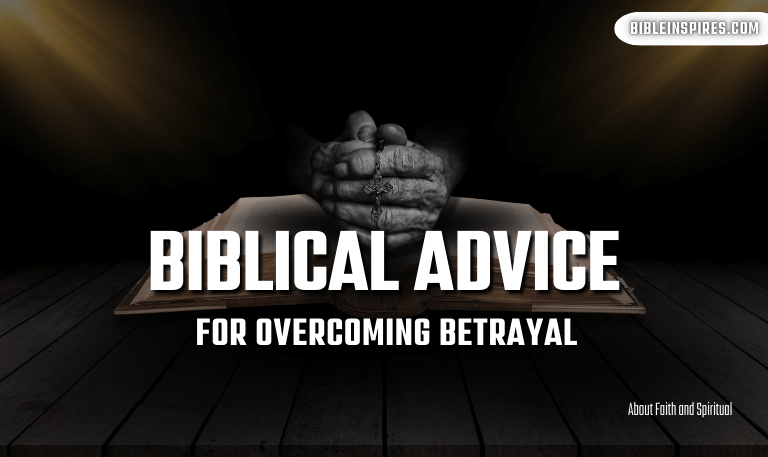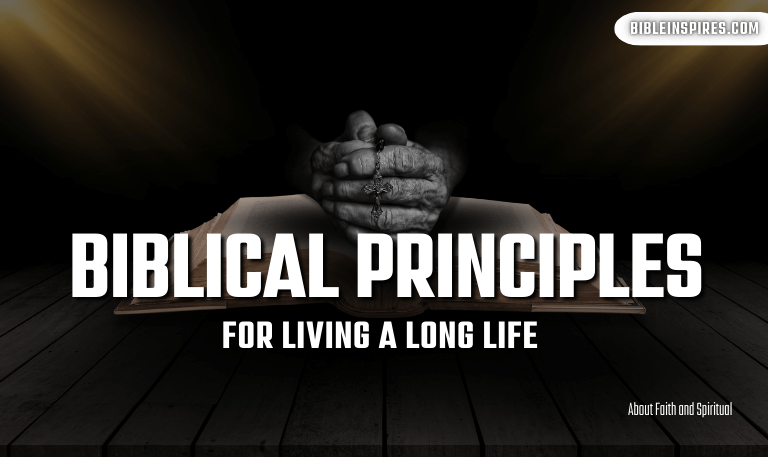Betrayal is one of the most painful and devastating experiences a person can endure. Whether it comes from a close friend, a family member, or even a spouse, betrayal can shatter trust, inflict deep emotional wounds, and leave a person feeling hopeless. But for those who turn to faith, particularly the teachings of the Bible, there is hope, healing, and a path to restoration. This article offers Biblical Advice for Overcoming Betrayal, providing guidance on forgiveness, emotional healing, and moving forward with grace.
Understanding Betrayal: A Biblical Perspective
Before diving into how to overcome betrayal, it’s essential to understand what betrayal truly is from a biblical viewpoint. Betrayal, in its most basic sense, is the act of breaking trust, often in a profound and hurtful way. It can involve lying, deceiving, abandoning, or even harming someone who had previously been trusted.
The Bible offers several examples of betrayal that provide profound lessons for believers:
Judas’ Betrayal of Jesus (Matthew 26:14-16): Judas’ betrayal of Jesus for thirty pieces of silver is one of the most well-known examples of betrayal in the Bible. Jesus, knowing he would be betrayed, remained focused on his mission and ultimately forgave Judas, even in the midst of his suffering.
David and Ahithophel (2 Samuel 15:31): Ahithophel, David’s trusted counselor, betrayed him by joining forces with David’s son, Absalom, to overthrow him. David’s response, though filled with grief, teaches us about trusting God’s plan even in times of betrayal.
Joseph’s Betrayal by His Brothers (Genesis 37:23-28): Joseph’s brothers sold him into slavery, causing him immense pain. However, Joseph’s eventual forgiveness of his brothers and his ability to recognize God’s hand in his suffering offer a powerful example of overcoming betrayal.
These biblical examples set the foundation for understanding betrayal from a faith-based perspective. Betrayal, although deeply painful, is not the end of the story. It is an opportunity to turn to God for healing, forgiveness, and restoration.
Read ALso: Bible Verses About Betrayal and Fake Friends
The Emotional Toll of Betrayal: Insights from Scripture

Betrayal doesn’t just cause external pain; it inflicts deep emotional wounds. In the Bible, we see the emotional toll betrayal can take on an individual.
Psalm 55:12-14: David speaks of the pain of betrayal, describing how it feels when a trusted friend turns on you. “If an enemy were insulting me, I could endure it; if a foe were rising against me, I could hide. But it is you, a man like myself, my companion, my close friend.” The emotional pain is amplified when the person who betrays you is someone you love and trust.
Psalm 41:9: “Even my close friend, someone I trusted, one who shared my bread, has turned against me.” This verse underscores the intense emotional pain caused by betrayal, especially when it comes from someone you have a deep, intimate connection with.
The emotional toll of betrayal is real, but the Bible offers hope for those who are hurting. Through faith, individuals can find solace, peace, and healing.
Biblical Teachings on Forgiveness After Betrayal
Forgiveness is one of the most essential aspects of healing after betrayal. The Bible emphasizes forgiveness as a necessary step to move forward, not only for the sake of the person who wronged you but also for your own emotional and spiritual well-being.
Read Also: Bible Verses About Fake Friends
1. Forgiveness as a Commandment

In Matthew 18:21-22, Peter asks Jesus how often one should forgive a brother who sins against them. Jesus replies, “I tell you, not seven times, but seventy-seven times.” Forgiveness, according to Jesus, is not a one-time act but a continual process. Forgiving someone who has betrayed you is essential for maintaining peace in your heart and in your relationship with God.
2. Jesus’ Example of Forgiveness
In Luke 23:34, as Jesus was being crucified, He prayed, “Father, forgive them, for they do not know what they are doing.” Despite being betrayed by His disciples and crucified by those He came to save, Jesus chose to forgive. His example of forgiveness is a powerful reminder of the grace and mercy we are called to extend to others, even in the face of deep hurt.
3. How to Forgive: A Biblical Approach
Forgiveness doesn’t mean forgetting what happened or excusing the wrong. Instead, it’s a conscious decision to release the offender from the debt they owe you. Ephesians 4:32 offers practical guidance: “Be kind and compassionate to one another, forgiving each other, just as in Christ God forgave you.”
Acknowledge your pain: Before forgiving, it’s essential to recognize the hurt caused by the betrayal.
Pray for strength: Pray for God’s strength to forgive, as it can often feel impossible.
Release the offender: Let go of the resentment, and trust that God will handle the justice.
Healing from Betrayal: Biblical Guidance
Healing from betrayal requires time, prayer, and reliance on God’s strength. Scripture provides numerous verses that speak to healing and restoration.
1. Relying on God’s Strength for Healing
In times of betrayal, it’s crucial to lean on God for emotional healing. Isaiah 41:10 offers comfort: “So do not fear, for I am with you; do not be dismayed, for I am your God. I will strengthen you and help you; I will uphold you with my righteous right hand.”
When betrayal leaves you feeling weak and vulnerable, God promises to be your strength, offering a firm foundation upon which you can rebuild your trust and your emotional well-being.
2. Finding Comfort in God’s Word

Scripture is full of verses that can bring comfort and healing after betrayal. Psalm 34:18 reminds us that “The Lord is close to the brokenhearted and saves those who are crushed in spirit.” Turning to God’s Word can provide peace, restore your hope, and help you process your emotions.
Read Also: Bible Stories About the Ocean
3. The Role of Prayer in Overcoming Betrayal
Prayer is an essential tool in the healing process. It allows you to express your pain, ask for God’s help in forgiving others, and seek comfort in His presence. In Philippians 4:6-7, Paul advises, “Do not be anxious about anything, but in every situation, by prayer and petition, with thanksgiving, present your requests to God. And the peace of God, which transcends all understanding, will guard your hearts and your minds in Christ Jesus.”
4. Trusting God’s Plan Amidst Betrayal
It’s difficult to understand why betrayal happens, but Jeremiah 29:11 reassures us: “For I know the plans I have for you, declares the Lord, plans for welfare and not for evil, to give you a future and a hope.” Trusting that God has a purpose in the midst of pain can help you endure and find healing.
Lessons from Jesus’ Betrayal
The betrayal of Jesus is one of the most profound lessons in the Bible regarding how to handle betrayal. Despite His suffering, Jesus showed us that betrayal does not have to define us. He offers examples of how to respond in love, mercy, and grace.
1. Jesus’ Response to Betrayal
When Judas approached Jesus with a kiss, signaling the beginning of His arrest, Jesus responded with love, asking, “Friend, do what you came for” (Matthew 26:50). Jesus did not retaliate or seek revenge. Instead, He maintained His focus on His mission to save humanity.
2. The Power of Love and Mercy in Overcoming Betrayal
In Luke 23:34, as Jesus hung on the cross, He prayed for the forgiveness of those who had wronged Him. His prayer was an expression of love and mercy, showing us that the way to overcome betrayal is through love.
Moving Forward: How to Live After Betrayal
Living after betrayal requires a mindset of hope and renewal. The Bible teaches that even after being hurt, we can move forward, trusting God to help us rebuild our lives.
1. Building Healthy Relationships After Betrayal
After betrayal, it’s essential to rebuild trust slowly. Proverbs 3:5-6 offers valuable advice: “Trust in the Lord with all your heart and lean not on your own understanding; in all your ways submit to Him, and He will make your paths straight.” It’s important to heal fully before entering new relationships, trusting in God’s timing and wisdom.
2. Setting Healthy Boundaries
While forgiveness is important, setting healthy emotional boundaries is essential for protecting your heart. Proverbs 4:23 reminds us, “Above all else, guard your heart, for everything you do flows from it.”
Read Also: Bible Verses About Peace and Ocean
Biblical Advice for Overcoming Betrayal FAQs
Q: How does the Bible define betrayal?
A: The Bible defines betrayal as the act of breaking trust, often involving deception or harm by someone who was once close.
Q: How can I forgive someone who betrayed me?
A: The Bible teaches that forgiveness is a choice, not based on the other person’s actions but on God’s grace. Forgive by acknowledging the pain, praying for strength, and releasing the offense.
Q: What should I do when I feel betrayed?
A: Turn to God for comfort, rely on prayer, and seek healing through Scripture. Trust that God has a plan for your life, even in the midst of betrayal.
Q: Can betrayal ever be fully healed?
A: Healing takes time, but with God’s help, you can overcome the pain of betrayal and emerge stronger in faith.
Conclusion
Betrayal is a painful and difficult experience, but the Bible provides clear guidance on how to overcome it. Through forgiveness, healing, and trusting in God’s plan, you can move past betrayal and restore peace in your heart. By looking to Jesus’ example, finding comfort in Scripture, and relying on prayer, you can emerge from betrayal stronger, wiser, and more aligned with God’s purpose for your life.

![How to Forgive According to the Bible [2025 Guide] 12 How-to-Forgive-According-to-the-Bible-[2025-Guide]](https://bibleinspires.com/wp-content/uploads/2025/04/How-to-Forgive-According-to-the-Bible-2025-Guide.png)

